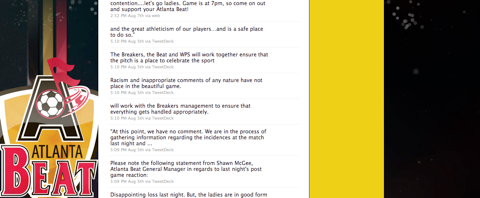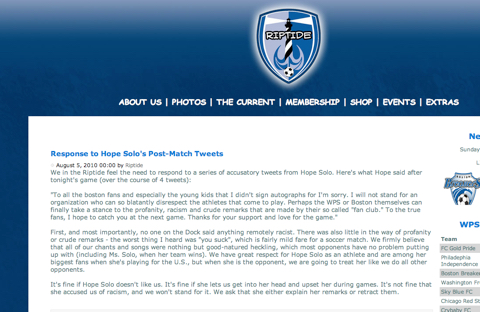Custom Digital Marketing, Social & Interactive Media Consulting
Boston Breakers
Ridin' Solo: When Keeping It Real Goes Wrong
Dec 22, 2010 06:43 PM
Being a student of all things related to interactive media and sports, I came across an intriguing situation toward the end of the summer from Women’s Professional Soccer. I thought it deserved a little closer examination as a ‘case study’ of sorts, looking at how organizations handle things posted on social media and what the consequences are for those who post.
It all begins back in early August. The Boston Breakers were hosting the Atlanta Beat in a WPS match. Following the match, Beat goalkeeper Hope Solo took to her Twitter account (@hopesolo) and posted the following:

In the span of four tweets, Solo demonstrated all that is great about Twitter and why people are wary of its use. Solo’s Twitter followers got a glimpse ‘behind the curtain’ with an explanation Solo thought her fans deserved. On the other hand, her comments were viewed by some as inflammatory, accusing Boston’s ‘fan club’ of less-than-family-friendly comments.
Now, the Atlanta Beat front office has a situation on their hands. One of their employees, a player, has made a public statement accusing the Boston’s supporters. Standard operating procedure in a situation like this is damage control -- issue a statement. Atlanta’s GM issued the following ‘official’ response to Solo’s statements, using the same medium she did (an important guideline to keep in mind when handling issues in social media):

One of the key attributes of social media -- its immediacy -- is both a selling point and a drawback. Followers have instant access and those involved can instantly respond, which the Riptide (Boston’s ‘fan club’ referred to by Solo) did:

That wasn’t the end of Solo’s (mis-)adventures on Twitter. She took to her account again following the season-ending loss to the Washington Freedom, implying that the officiating was slanted in favor of Washington and that the league (Women’s Professional Soccer) wanted Freedom in the playoffs, manipulating circumstances to ensure that outcome. This time, Solo’s tweets netted her a $2,500 fine, suspension for one game and eight hours of community service. (Those comments, as well as others made by WPS players and personnel are addressed in this article here.)
So, what’s the point? Why dig up something that happened months ago? I find it interesting to look at the differences in the aftermath of Solo’s tweets.
The beauty of Twitter, and social and interactive media in general, is the immediacy and the unfettered access it allows followers to have to their favorite athletes. Fans of Hope Solo follow her on Twitter because she has strong opinions and is not afraid to voice them. Her fans love her for that and would expect nothing less from their favorite goalkeeper.
The line that was crossed, I think, is when Solo called into question the integrity of the league and its officiating. Similar to the secret fines (that ended up being not so secret) that NASCAR handed Denny Hamlin and Ryan Newman for comments they made, the issue was attacking the integrity of the sport. With Hamlin and Newman, it was implying that NASCAR (the league) was manipulating the race by throwing caution flags for debris that wasn’t there. With Solo, it was implying WPS (the league) and its officials conspired to make sure Washington won the game and advanced into the playoffs.
This is the challenge faced by those who leverage interactive and social media -- how to balance the openness and free-flow of ideas that people love about social media with protecting, defending and monitoring their brand (be it team, company, charity, product, whatever).
Regardless of where you set your ‘line’ -- the point where comments made in the social media space will trigger some form of consequence or punishment -- the key is to know where that ‘line’ is before you dive into the social media space. Have a set of guidelines and remain as consistent as possible when adhering to them.
It all begins back in early August. The Boston Breakers were hosting the Atlanta Beat in a WPS match. Following the match, Beat goalkeeper Hope Solo took to her Twitter account (@hopesolo) and posted the following:

In the span of four tweets, Solo demonstrated all that is great about Twitter and why people are wary of its use. Solo’s Twitter followers got a glimpse ‘behind the curtain’ with an explanation Solo thought her fans deserved. On the other hand, her comments were viewed by some as inflammatory, accusing Boston’s ‘fan club’ of less-than-family-friendly comments.
Now, the Atlanta Beat front office has a situation on their hands. One of their employees, a player, has made a public statement accusing the Boston’s supporters. Standard operating procedure in a situation like this is damage control -- issue a statement. Atlanta’s GM issued the following ‘official’ response to Solo’s statements, using the same medium she did (an important guideline to keep in mind when handling issues in social media):

One of the key attributes of social media -- its immediacy -- is both a selling point and a drawback. Followers have instant access and those involved can instantly respond, which the Riptide (Boston’s ‘fan club’ referred to by Solo) did:

That wasn’t the end of Solo’s (mis-)adventures on Twitter. She took to her account again following the season-ending loss to the Washington Freedom, implying that the officiating was slanted in favor of Washington and that the league (Women’s Professional Soccer) wanted Freedom in the playoffs, manipulating circumstances to ensure that outcome. This time, Solo’s tweets netted her a $2,500 fine, suspension for one game and eight hours of community service. (Those comments, as well as others made by WPS players and personnel are addressed in this article here.)
So, what’s the point? Why dig up something that happened months ago? I find it interesting to look at the differences in the aftermath of Solo’s tweets.
The beauty of Twitter, and social and interactive media in general, is the immediacy and the unfettered access it allows followers to have to their favorite athletes. Fans of Hope Solo follow her on Twitter because she has strong opinions and is not afraid to voice them. Her fans love her for that and would expect nothing less from their favorite goalkeeper.
The line that was crossed, I think, is when Solo called into question the integrity of the league and its officiating. Similar to the secret fines (that ended up being not so secret) that NASCAR handed Denny Hamlin and Ryan Newman for comments they made, the issue was attacking the integrity of the sport. With Hamlin and Newman, it was implying that NASCAR (the league) was manipulating the race by throwing caution flags for debris that wasn’t there. With Solo, it was implying WPS (the league) and its officials conspired to make sure Washington won the game and advanced into the playoffs.
This is the challenge faced by those who leverage interactive and social media -- how to balance the openness and free-flow of ideas that people love about social media with protecting, defending and monitoring their brand (be it team, company, charity, product, whatever).
Regardless of where you set your ‘line’ -- the point where comments made in the social media space will trigger some form of consequence or punishment -- the key is to know where that ‘line’ is before you dive into the social media space. Have a set of guidelines and remain as consistent as possible when adhering to them.
Comments